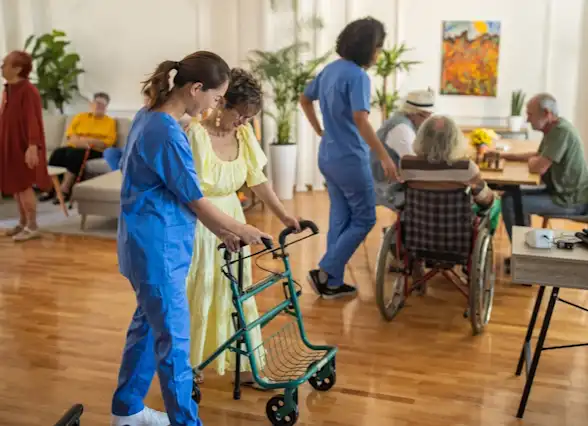Caregiving Challenges, Thinking About Assisted Living?
What is the best way to approach thinking about your loved one moving into an assisted living facility (ALF)?
Get insurance benefits, legal documents, and medical records in one place

Helpful Highlights
Both you and your loved one may struggle with the decision to make the move to an assisted living facility (ALF).
There are many things to consider, and typically a number of trade-offs occur - what they're giving up balanced with what they're gaining.
This article details those considerations and lays out a roadmap for the process.
The choice to move your loved one from their home or your home into an assisted living facility (ALF) is a difficult one for both of you and potentially other family members. It’s highly emotional, mentally draining, and physically tiring. Your loved one may not want to face giving up the things in their home that they have loved for years and that have happy memories attached. And you may feel like you're abandoning them or giving up on your responsibilities. Remember... This is a process.
When is it a good time to consider a move?
When your loved one wants freedom from home maintenance and repairs, or
When your loved one wants a community and a variety of activities they don't have at home, or
When consistent or constant care and assistance are wanted or needed.
When do you start looking?
Take it one step at a time so an ALF that best fits your loved one's wants and needs can be chosen. There is always more than one choice.
Start looking well before a move is needed. Some ALFs have a waiting list. And even without a waiting list, moving in will not happen the next day.
How do you find ALFs in your area?
Note that some ALFs have been established in large private single-family or multiple-family, homes that have been converted for this purpose. These can be difficult to find and don't exist in all areas but may be the best environment for your loved one versus a large complex.
Your loved one may have friends who have already made the move, so talk with them.
Ask your friends and coworkers if they know of local ALFs in your area, especially those who have loved ones in them already.
Ask your primary care provider, ask your loved one's primary care provider.
Ask the discharge planner or a social worker at your local hospital, who may be able to give you a list.
Call your local hospice agency, as they typically provide services in ALFs, and may be able to give you a list.
Do internet research, type in words and phrases like: 'assisted living facilities in (insert city, county, or state)', or even just 'assisted living facilities near me'.
If your state licenses ALFs, which most do, you can get a complete list from the state.
Things to consider
Decide the location first. Do you want them to be close to you, or to other family members or friends?
Maybe they want to live at a specific facility where their friends reside.
Will this involve a move to another city or state?
Will your loved one prefer a large complex, small complex, or converted home?
Will you and your loved one prefer a continuous care retirement campus (CCRC)?
CCRCs have independent living, assisted living, memory care, and skilled nursing all on one campus.
Will your loved one prefer a studio apartment? A one-bedroom apartment? A private or shared bedroom in a small facility or private home?
Will you want an ALF that has nursing on-site?
Will you want an ALF that allows pets?
Does your loved one have dementia or Alzheimer’s?
Comparing costs
Assisted living “rent” covers private space, all maintenance, 3 meals/day plus snacks, transportation, utilities, and community-sponsored activities and events.
Compare this to the cost of remaining at home:
Mortgage, if applicable
Home repairs and upkeep
Home maintenance: housekeeping, lawn care, pool care, gutter cleaning, etc.
Insurance
Property taxes
Utilities: electric, gas, water, cable TV, internet, phone, trash
Groceries
Hired care and assistance, such as companions and home health aides
Transportation
Often, the cost of remaining at home and the ALF monthly fee is close, so you'll want to discuss determining factors. Let's call them "tie-breakers".
Personal items are not covered by ALFs - clothing, personal hygiene products, etc.
No content in this app, regardless of date, should ever be used as a substitute for direct medical advice from your doctor or other qualified clinician.
Get more support and guidance on insurance benefits, medical records and legal forms.
Helpful brings together your insurance benefits, legal documents, and medical records in one personalized place — so you always know what you have, and never have to search again.

Technology for Health Tasks. Mental Health for the Tough Stuff.
Helpful connects your medical records, insurance, and caregiving tasks automatically. And when you need more than logistics, a therapist is here to guide you.
In-Network and Covered
For Individuals, Couples and Families
HIPAA Compliant, Data Stays Private


Healthcare Tasks Simplified

From syncing records to spotting drug interactions, Helpful does the heavy lifting, turning complex health info into clear tasks and showing you benefits you can actually use, giving you clarity and control over your care.

In-Network Mental Health

Our licensed therapists are here to support you and your loved ones through stress, burnout, and life’s hardest moments, with an inclusive, compassionate approach that works with most insurance plans.

Create Legal Documents

Plan ahead by creating will, trusts, advance directives and more, that ensure your wishes are honored in the event you can’t speak for yourself -with Helpful guiding you every step of the way.